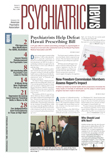Between 2001 and 2003, Ronald Kessler, Ph.D., a professor of health care policy at Harvard Medical School, and colleagues undertook a formidable challenge—determining the status of Americans' mental health.
Their assessment—called the National Comorbidity Survey Replication—was based on detailed interviews with more than 9,000 Americans, representative of the American population. The major results from the survey were published in the June 2005 Archives of General Psychiatry (Psychiatric News, July 15, 2005).
Now in the April American Journal of Psychiatry, Kessler and his team reported what they have learned from their survey about adult attention-deficit/hyperactivity disorder (ADHD). This illness was not addressed by the last two major American psychiatric epidemiology surveys—the Epidemiologic Catchment Area Study and the National Comorbidity Survey.
Because of concern about recall failure among older adults, Kessler and his coworkers decided to assess only 3,199 of their survey participants, all between 18 and 44 years of age, for the presence of adult ADHD. The assessments were conducted by lay interviewers using the Diagnostic Interview Schedule for DSM-IV. Respondents who indicated that they had had ADHD in childhood were then asked an additional question—whether they continued to have any ADHD symptoms. Of the 3,199 participants, 3 percent were found to have had childhood ADHD as well as current ADHD symptoms.
Then 154 of the 3,199 participants—representing an oversampling of those with adult ADHD symptoms—were assessed in reappraisal interviews for adult ADHD. These interviews were conducted by clinical psychologists who used the Adult ADHD Clinical Diagnostic Scale. Although there is no standard method for diagnosing adult ADHD, this scale has been used in adult-ADHD clinical trials.
Kessler and his team then used both the initial interview results and the reappraisal-interview results to derive an estimated prevalence of adult ADHD for the entire sample of 3,199 participants. The estimate prevalence they obtained was 4 percent.
Few Get Treatment
Moreover, Kessler and his colleagues learned, survey participants who had adult ADHD were more often male than female; were often unemployed, no longer married, and impaired in such areas as thinking, taking care of themselves, and getting about; and often had other mental illnesses, notably anxiety, depression, a substance use disorder, or intermittent explosive disorder.
Only 10 percent of those diagnosed with adult ADHD were receiving treatment for it. This is a much lower percentage than the number of Americans being treated for anxiety, mood, and substance use disorders.
Their results, Kessler and his coworkers noted, make one wonder whether treatment of adult ADHD might mitigate the mental illnesses that often accompany the condition. After all, they explained, a diagnosis of adult ADHD requires that at least some of the symptoms of ADHD began before the age of 7, so the mental conditions that often accompany it probably occurred at a later age and perhaps in response to the ADHD.
Indeed, the researchers pointed out, successful treatment of ADHD in children often reduces the symptoms of mental disorders that frequently occur along with ADHD.
Taken together, Kessler and his team concluded, their results regarding adult ADHD were mostly what they had expected. However, one finding did surprise them—a lower prevalence of adult ADHD among blacks and Hispanics than among whites. This outcome, they reasoned, could reflect true racial or ethnic differences or perhaps a greater acceptance of ADHD symptoms by blacks and Hispanics.
More Screening Needed
“This is a well-designed, cross-sectional study of the prevalence of adult ADHD,” Tony Rostain, M.D., director of education in the University of Pennsylvania Department of Psychiatry and an adult ADHD authority, told Psychiatric News. “The authors used rigorous methods to screen and interview 154 respondents in order to determine the rate of ADHD diagnosis, as well as demographic correlates and comorbid disorders seen in subjects with ADHD.
“Their finding that 4.4 percent of the adult population meets criteria for ADHD is credible, as are the findings of significantly increased rates of depression, anxiety, substance abuse, and intermittent explosive disorder in this group. Finally, the low rates of treatment for ADHD that these patients are receiving underscores the importance of careful screening for the disorder, especially in adult patients being treated for depression, anxiety, and substance abuse.”
The National Comorbidity Survey Replication was funded by the National Institute of Mental Health, the National Institute on Drug Abuse, the Substance Abuse and Mental Health Services Administration, the Robert Wood Johnson Foundation, and the John W. Alden Trust. Additional support for the adult ADHD assessments came from a grant from Eli Lilly and Co.
